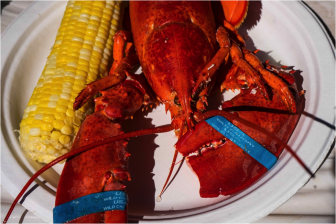One of New Canaan’s most celebrated community events is scheduled to return this September, though it may look a little different than some locals remember.

Photo: Lobster dinner from the Rotary Lobsterfest.
Founded by the New Canaan Rotary Club, the first Lobsterfest was held 38 years ago as a way to raise money for local nonprofit organizations, as well as offer a weekend of fresh seafood and lobster-themed festivities to the local community. Last year, it raised more than $60,000 for local nonprofits.
Until the COVID-19 pandemic, Lobsterfest was synonymous with the New Canaan Museum & Historical Society campus, having been located on its grounds for decades, but with new lockdown restrictions, the club was forced to change the format of its fundraiser entirely, or shut it down.
Leo Karl III, a 35-year member of the Rotary Club, has been an active participant in organizing Lobsterfest for nearly as long as it has been around. Despite the challenges posed by the pandemic, he did not see the new restrictions as a negative, instead seeing a unique opportunity to fix some of the problems the event faced in past years.
“Prior to the pandemic, our event was really—I’ll call it more of a ‘grassroots’ effort that was staffed and run by members of the club,” Karl told NewCanaanite.com. “We sold tickets, there were printed tickets, and the tickets were either redeemable on either Friday or Saturday evening. The event has dates of Friday night and Saturday night, from 4 to 8 p.m., two nights. But in the past, before COVID, we would sell tickets and honestly we wouldn’t have any specific idea other than a guide of experience of how many people were gonna show up at what hour during those times.”
The broad time slot allotted for attendees to collect their food would often lead to volunteers either preparing too much, affecting the freshness, or too little, which led to large lines. Considering Lobsterfest was an event that consistently attracted more than 1,000 attendees, this was a major point of concern for organizers. Luckily, the pandemic offered them a ready solution to this problem.
“We really tried to do a 180-degree pivot and we saw what some of the local restaurants were doing very successfully in terms of converting their in restaurant dining to curbside pickup,” Karl said. “That was a way a lot of us supported our local restaurants, we wanted to see them survive the pandemic.”
With the new goal in mind of shifting to a curbside pickup model, Rotary Club began working with local businesses to see if any of them would be interested in facilitating their event.
“We saw that model work for restaurants, and we said why can’t we do it for our Lobsterfest?” Karl recalled. “So we looked to professional food partners, at Fjords Seafood, and also Walter Stewart’s, because we knew again during the pandemic, we couldn’t have members handling the food. It had to be very hygienic.”
While a curbside model allowed Lobsterfest to remain active during the pandemic, it also had several other benefits.
“I think the first year we did this was probably 2020 during the pandemic,” Karl said. “I think we did 850 to 900 takeout meals, and it turned out to be hugely successful, and at the end of that weekend I remember, saying it was remarkable, I think every single person that had ordered or bought a ticket showed up and picked it up almost within the prescribed time slots. It was really remarkable how smoothly it flowed.”
One of the other hidden benefits of switching to a curbside model was that it allowed organizers to ensure each meal was hot and ready when the customer arrived to pick it up, something which was impossible in previous years due to the open pick-up window.
“The new format has worked really well and I think we will continue to do Lobsterfest this way, Karl said. “It really helps with the flow of food prep, it ensures that each dinner is prepared on time, it’s served hot, it just flows really well.”
Lobsterfest reopened tables to the public in 2021, offering limited seating at its new location, the Steve Benko Pool at Waveny Park. Last year marked the first time attendees were able to dine in again without restriction, which is set to continue this year.
“We expect probably some more people will choose to dine in, because we’re all a little more comfortable now,” Karl said. “It is after all, sort of a community event, a lot of shared camaraderie and good experience seeing other folks out and dining.”
The New Canaan Rotary Club is a local nonprofit organization that is part of a larger, national organization, called Rotary International. Founded in Chicago during the early 1900s by an attorney named Paul Harris, the purpose of the organization was to gather local business leaders together to help alleviate some of the social needs of their community. The term “Rotary Club” came from members of the club hosting their weekly meetings in their offices, “rotating” which member’s office would be the location for every meeting. Their impact on the community of Chicago was so great that it inspired many other local communities to form their own clubs. Today, there are around 1.4 million members of Rotary Clubs around the world, spread across 168 countries and 46,000 different clubs.
